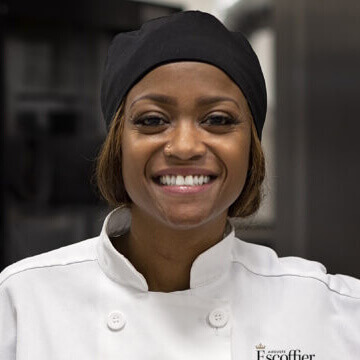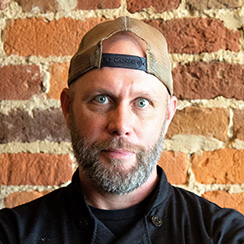Listen to This Article:
Franchising continues to grow in popularity in the food industry. It can provide opportunities for both successful restaurant owners who want to scale and those interested in becoming food entrepreneurs.
According to a recent Franchising Economic Outlook report by the International Franchise Association, food franchises, especially quick-service dining, are forecasted to continue increasing.
This guide offers valuable information for you to consider whether you’re thinking about buying a franchise or you currently own a restaurant and are looking to expand through franchising.

Purchasing a franchise can fast-track you to restaurant ownership.
What Is a Franchise Restaurant?
A franchise is when an individual purchases the rights to use the name, brand, and business model of a restaurant from the original owner. Examples of franchises are all over the world, from Baskin Robbins and Subway to Starbucks. While the locations look and operate exactly the same, they have different owners operating off the same model. Restaurant franchises can help create a win-win situation for established restaurant owners and those who want to own a restaurant.
A successful restaurant becomes a franchisor when it allows others to buy licenses to operate under its brand name and established business model. This helps the restaurant to expand into new locations without the restaurant owner needing to manage every location. Someone who pays the franchise fee gets a jumpstart on owning a restaurant, including a proven business model, training, and support to help their chance of success with potentially less risk.**
**Note: Auguste Escoffier School of Culinary Arts does not provide financial advice. Always consult with a professional to determine what is best for your situation.
Key Words & Definitions
- Franchisor: An established restaurant that licenses its brand and systems to franchisees
- Franchisee: The entrepreneur who purchases the franchise license and runs a restaurant under the brand name and business model.
- Franchise Fee: The fee that the franchisee pays for the ability to operate a franchise
- Initial Investment: Total investment made by the franchisee, including the franchise fee and all other expenses to get the restaurant up and running.
- Royalty Fee: Typically, a percentage of gross sales is paid to the franchisor by the franchisee on an ongoing basis.
- Franchise Agreement: The legal contract between the franchisee and franchisor.
- Operating Manual: Detailed guide and business model the franchisee is to follow.
- Franchise Disclosure Document: Federal Trade Commission-mandated form that provides a baseline level of information to potential franchisees.
Inside the Process for Potential Franchisees
So you’re thinking of opening a restaurant? While the idea of owning your own independent restaurant may be appealing, there are many benefits to buying a restaurant franchise to get started.
If McDonald’s is the first thing that comes to mind when you hear “restaurant franchising,” be assured that there are many franchises to consider in the food and drink industry so you can find something that suits your style and taste. If you enjoy French pastries, Le Macaron might grab your attention. Or you could introduce your local community to a taste of England through a franchise of Shelly’s Tea Rooms. From charcuterie boards and bubble tea to Mediterranean dishes, there’s a wide selection of franchises available.
While franchises can come with a hefty price tag upfront, between a proven business model, brand name recognition, and operational support, they can provide a step-by-step guide to help you succeed in the restaurant industry. And with an economic output of over 800 billion U.S. dollars annually, it may be worth looking into if you want to own a restaurant.
Here’s what you need to consider before starting the franchising journey.**
Benefits of Buying a Restaurant Franchise
- Brand Recognition: Owning a restaurant with brand recognition and established marketing initiatives can make it easier to succeed than if you start from scratch.
- Proven Business Model: A proven business model and framework can help you start without reinventing the wheel.
- Training and Support: Training and operational support from the franchisor can assist you in managing the restaurant and its employees.
- Reduced Risk: Opening a new location of an existing successful restaurant can potentially reduce the risk of failure compared to starting your own restaurant.
**Note: Auguste Escoffier School of Culinary Arts does not provide financial advice. Always consult with a professional to determine what is best for your situation.

Franchises can help provide the business model and systems you need to open and operate a restaurant.
Drawbacks of Buying a Restaurant Franchise
- Initial Investment: The initial investment and ongoing royalty fees can be expensive if you are just starting.
- Less Control: Following the existing brand and business model gives you less control over the menu, branding, and operations.
- Location Restrictions: There are limited territory restrictions which vary based on what franchise you purchase. You may not be able to open the franchise in the area you would choose.
- Less Creative Freedom: If you’ve dreamt of opening your own restaurant, sticking to the existing business model and menu can be limiting and not look like what you envisioned.
*Information may not reflect every student’s experience. Results and outcomes may be based on several factors, such as geographical region or previous experience.
While restaurant franchising may require a large upfront investment and limited flexibility within how you run the business, it can provide a clear and structured path to owning a restaurant.
For Restaurant Owners Considering Franchising
Has your restaurant concept turned into a success and now you’re dreaming of scaling? Franchising can be an effective and powerful way to achieve your expansion goals. You can see your restaurant reach new markets while helping provide other food entrepreneurs with the chance to run their own restaurants.
By considering the benefits and hurdles of franchising, you can make an informed decision about whether this is the right growth strategy for your restaurant.
Benefits of Franchising Your Restaurant
- Business Expansion: Franchising your restaurant can help you experience rapid business expansion without requiring you to personally manage every new location. The day-to-day tasks of operating each new location don’t fall on your shoulders.
- New Revenue Streams: Restaurant franchises can help expand your business revenue by adding new revenue streams, such as royalties and franchise fees.
- Increased Brand Awareness: Additional locations in new markets can help increase brand awareness, which may assist in further growth.
Challenges of Franchising Your Restaurant
- Additional Tasks on Your To-Do List: Franchising your restaurant brings new tasks to your plate. You’ll need to find the right individuals to become franchisees, which may be a time-consuming process.
- Brand Consistency Challenges: Brand consistency is important for the success of each location and this may be difficult to manage with different owners managing and operating on their own. You need to trust and put checks and balances in place to ensure franchisees follow your brand model.
- Need for Training and Support Personnel: While you don’t have to run the day-to-day operations of each location, franchisors need to provide training and ongoing support to franchisees. This will require you to take on new tasks or form new roles within your business.
Rapid expansion may be a draw as you look to increase your business revenue, but it’s important to weigh the benefits and challenges before deciding if it’s the right option for you and your restaurant.
Steps to Buying a Restaurant Franchise
Purchasing a franchise may sound easier than starting a food business from scratch, but it’s crucial that you do your due diligence before jumping in with both feet. These steps can help you navigate the process of choosing and buying a franchise.
1. Understand the Opportunity in Front of You
Reading this article is a good starting point as you consider whether buying a franchise is a good option for you. While spending time researching may not sound exciting, it can help you make a wise decision about whether to buy a franchise and, if so, which ones to consider.
Consider your interests and what restaurant chains sound appealing to you. Your options can range from fast food and fine dining restaurants to smoothie shops and bakeries. You’ll also want to consider what general location you’re interested in opening a franchise. There are often limitations based on the specific franchise.
Once you narrow your search by selecting the top franchises that interest you, it’s time to begin researching the details of the franchise agreements. Research the franchise fee, royalty fees, and ongoing support offered by the franchise.
You’ll also want to learn about the franchisee qualifications you will need to have before moving forward. You may find qualifications like net worth requirements and business or management experience.

Researching potential franchise options is the first step to owning a franchise.
2. Explore Financing Options
Access to capital is one of the determining factors for want-to-be franchisees. Before selecting which franchise you want to invest in, determine how much capital you’ll have available. Franchise fees can range from tens of thousands of dollars to millions of dollars.
However, you don’t need to have the total amount of cash available in your bank account to invest in a franchise. There are other options you can try to secure capital, including SBA loans, equipment financing, business lines of credit, and other bank loans.**
**Note: Auguste Escoffier School of Culinary Arts does not provide financial advice. Always consult with a professional to determine what is best for your situation.
In addition to needing funds for the initial franchise fee, you’ll also need to ensure you have funds to cover the operating costs once your franchise location is open. Determining how much you can invest in a franchise will help you determine which options are realistic as you continue to explore the possibilities.
3. Complete Due Diligence
Now that you know the requirements and details of the franchise options that interest you, along with how much money you have to invest, it’s time to select a franchise.
With your chosen franchise opportunity, you should now review the Franchise Disclosure Document (FDD). Franchisors are required by federal and state law to provide this document to prospective franchisees. The document is a standardized document that includes the following items about the franchise.
| 1. Franchisor’s Background | 9. Franchisee’s Obligations | 17. Renewal, Termination, Transfer, and Dispute Resolution |
| 2. Business Background | 10. Financing | 18. Public Figures |
| 3. Litigation History | 11. Franchisor’s Assistance, Advertising, Computer Systems, and Training | 19. Financial Performance Representations |
| 4. Bankruptcy | 12. Territory | 20. Outlets and Franchisee Information |
| 5. Initial Fees | 13. Trademarks | 21. Financial Statements |
| 6. Other Fees | 14. Patents, Copyrights, and Proprietary Information | 22. Contracts |
| 7. Estimated Initial Investment | 15. Obligation to Participate in the Actual Operation of the Franchise Business | 23. Receipts |
| 8. Restrictions on Sources of Products and Services | 16. Restrictions on What the Franchisee May Sell |
The FDD provides important information to help you gain a big-picture view of the business, your responsibilities, and the risks involved. It’s mandated that you receive this document before the sale of the franchise and as part of a 14-day disclosure period. Make notes of any questions you have and ensure you get answers from the franchisor prior to signing a franchise agreement.
It’s also a good idea to talk to existing franchisees to learn more about their experience and ask for advice for getting started. Learning from those who have already walked the path can help you gain a clearer understanding and set realistic expectations.
4. Attend a Discovery Day Event
Discovery Day events give serious and often pre-qualified, prospective franchisees a chance to visit the franchise headquarters and meet with the executive team. This is a chance for franchisors to sell themselves and their opportunity and for franchisees to get their final questions answered while learning more about the business’s culture, values, and operation.
Embrace the opportunity to ask questions about the support provided, the capital requirements, and the company’s values. This is your chance to ensure the franchise aligns with your values and goals.

Meeting with the franchise executives during Discovery Day events can help you learn what you need to know before deciding to purchase a franchise.
5. Choose a Location
Each franchise comes with different requirements and limitations on choosing a location for your restaurant. This process can help avoid oversaturating a market, which can help set each franchisee up for success.
Once you understand the selected territory you could work in, you can propose a specific location to the franchisor for approval.
6. Sign a Franchise Agreement
If everything checks out in the FDD and during your discovery day, you can take the next step of signing the franchise agreement. While you may want to try negotiating the franchise fee, you want to work with a franchisor with a strong franchise system set in place, which typically means they don’t negotiate on key pieces of the agreement.
Remember that what’s written in the contract is what will be enforced legally, so ensure that there are no discrepancies between what the franchisor has told you and what’s documented in writing. It can be wise to work with a franchise lawyer who can assist you in reviewing the FDD and agreement to catch any issues you may overlook or be unaware of.†
†Auguste Escoffier School of Culinary Arts does not provide legal advice. Always consult with an attorney before creating a new business entity!
6. Complete Any Necessary Franchise Training
There will likely be required corporate training to help you become an expert on your franchise. This varies from one franchise to the next. Remember that the ultimate success of your franchise restaurant depends on you. While the franchisor provides pieces like the business model, systems, and marketing efforts, embrace the opportunity of owning a restaurant and give it your attention the same way you would if you were starting from scratch.
Top Restaurant Franchises (with Requirements)
To get the ideas flowing, let’s look at some of the top restaurant franchises and their requirements for franchisees. We’ve also included a range of initial franchise fees, including a couple of up-and-comers to help you see the wide range of possibilities that exist in restaurant franchising.

There are a variety of franchise establishments to consider to help you achieve your dream of owning a restaurant.
IHOP
- Investment Range: $1,200,000-$6,600,000
- Royalty Fee: 4.5% of gross sales
- Financial Requirements: Minimum financial net worth of $1.5 million and $500,000 in liquid assets
- https://franchise.ihop.com/en/us
Baskin Robbins
- Investment Range: $293,840 – $626,360 (including $25,000 franchise fee)
- Continuing Franchise Fee: 5.9%
- Continuing Advertising Fee: 5%
- Royalty Fees: 2.9% during 1st year, 3.9% during 2nd year, 4.9% during 3rd year
- Financial Requirements: Minimum financial net worth of $200,000 and liquidity of $100,000
- Capital contributions and financing options may be available
- https://www.baskinrobbinsfranchising.com/investment/
Smoothie King
- Investment Range: $268,900 – $858,900 (including $30,000 franchise fee)
- Operating Fee: 6% of gross sales ($500 monthly minimum)
- Marketing Fee: 3% of monthly gross sales
- Financial Requirements: Minimum net worth of $300,000 and liquidity of $100,000, a credit score of 700+
- https://www.smoothiekingfranchise.com/
Teriyaki Madness
- Investment Range: $312,500 – $731,260 (including $45,000 franchise fee)
- Royalty Fees: 6% of net sales
- Marketing Fund Contribution: 3% of net sales
- https://franchise.teriyakimadness.com/
Firehouse Subs
- Investment Range: $400,000 – $500,000 (including $20,000 franchise fee)
- Royalty Fees: 6% of sales
- Marketing Fund Contribution: 3% – 5% of sales
- Financial Requirements: Net worth of $300,000+, $150,000 liquid assets
- https://www.firehousesubsfranchising.com/
Scooter’s Coffee
- Investment Range: $794,000 – $1,341,500 (including $40,000 franchise fee)
- Royalty Fees: 6% of sales
- Marketing Fund Contribution: 2% of sales
- Financial Requirements: Net worth of $500,000+, $250,000 liquid capital
- Financial options may be available
- https://franchising.scooterscoffee.com/
Nautical Bowls
- Investment Range: $100,000 down and all-in investment of $300-400,000
- Royalty Fees: 6% of sales (2% goes to the National Marketing Fund)
- Financial Requirements: Net worth of $250,000, $75,000 – $100,000 of liquid capital
- Veteran Discount: 10%
- Financial options may be available
- https://nauticalbowls.com/franchise/
Mooyah Burgers, Fries, & Shakes
- Investment Range: $495,918 – $1,168,251 (including $40,000 franchise fee)
- Royalty Fees: 6%
- Marketing Fee: 3%
- Financial Requirements: Net worth of $1.5 million with $500,000 liquidity
- Experience: Prior experience with business, franchise, or restaurant operations
- https://mooyahfranchise.com/
Becoming a Franchisor (For Restaurant Owners)
Turning your successful restaurant into a replicable business model requires careful planning and execution. The following steps can help you learn more about how to create a robust business model and recruit the right franchisees.
Develop Your Franchise Model
The foundation for franchise success begins with a solidified business model that others can replicate themselves. Below are some steps to help you create this model:
1. Standardize Operations
Begin by identifying your business practices and current operations. You’ll need to document every step in your business, including your recipes, food preparation, inventory management, customer service standards, and employee training. This information will become the operational manual that franchisees can use as a roadmap to success. These documented systems and procedures also help ensure brand consistency at each new location.
2. Develop a Comprehensive Training Program
When you franchise your restaurant, you are responsible for training franchisees and equipping them with the skills they need to operate the restaurant successfully. Create a training program that combines classroom instruction, online training, and hands-on experience and covers everything from operational procedures to financial management.
3. Establish Marketing & Brand Guidelines
It’s important to protect the integrity of your brand as you offer franchise opportunities. Develop a comprehensive marketing guide that franchisees can follow, including approved logos and marketing materials for signage.
You’ll also need to provide clear guidelines for marketing messages, including social media messaging. These guidelines can assist in providing customers with a consistent experience regardless of what franchise location they interact with.
Recruit Franchisees
When you are looking for franchisees, it can be important to find individuals who share your business’s vision and values. These tips can help you attract the right franchise partners.
1. Develop Marketing Materials
Marketing can help you reach a wide audience of potential franchisees. Focus on highlighting the strength of your restaurant brand, what you provide to help franchisees succeed, and the potential profitability. Think about what questions potential franchisees will have and work to address them upfront in your marketing efforts.
Consider marketing through multiple channels, including digital and traditional marketing, to reach your target audience.
2. Create Requirements to Help Qualify Franchisees
Decide what financial requirements you want to establish for franchisees. This can include limits on net assets and a separate requirement for liquid or cash assets. It’s important that franchisees have the financial resources they’ll need to build, open, and operate a location.
You’ll also want to consider what management or business ownership experience you want franchisees to have. You may also want to see a strong work ethic and passion for your brand.
3. Offer Ongoing Resources & Support
Developing a system for strong ongoing support can be a draw for potential franchisees. Build a library of resources they can access, from marketing materials to best practices that can help franchisees work toward success. You may want to have operational specialists or a team of trainers who can guide new franchisees, answer their questions, and oversee the new location long after the franchise agreement is signed.
Consider Hiring a Professional to Help You Franchise
There are professionals who can help you successfully work toward franchising your restaurant. Working with these individuals can help make the process smoother for you.** These individuals can include:
- Franchise Consultant: Guides you throughout the entire process, from developing your franchise model to establishing recruiting strategies.
- Franchise Attorney: Assists you with the legal aspects of franchising, from drafting your franchise agreement to ensuring you stay compliant with state and federal regulations.
- Franchise Marketing Specialists: Creates marketing materials and a plan to help recruit franchisees.
- Operations Manual Developer: Assists you with documenting your processes and operations to create the manual for franchisees to follow.
- Franchise Sales Broker: Works to help connect you with qualified potential franchisees.
- Human Resources Consultant: Assists with developing screenings, recruitment materials, and onboarding procedures.
- Accountant: Helps you create financial projections, ongoing royalty calculations, and can help you determine how to structure your franchise fees.
**Note: Auguste Escoffier School of Culinary Arts does not provide financial advice. Always consult with a professional to determine what is best for your situation.
While franchising your restaurant can be a path to business expansion, there are many steps to developing a successful franchise model. The steps above are a general overview of what can be required to turn your restaurant into a franchise. Take time to speak with franchise experts to guide you throughout the process.
Your Next Steps in Food Entrepreneurship
Franchises can place you on the fast-track to restaurant ownership or business expansion, but there are important considerations to make along the way.
As a franchisee, your initial investment can provide step-by-step help and support to get you from the idea phase to opening the doors and welcoming your first customer. But even with the extra guidance, the success of the restaurant still requires your hard work and dedication.
While franchising your business can lead to more rapid expansion, there are important steps to take along the way to help you succeed in the world of restaurant franchising.
Restaurant franchising is just one option to consider if you’re interested in Food Entrepreneurship. Regardless of the path you choose, Auguste Escoffier School of Culinary Arts can help start you on the right foot with the knowledge and skills you need to thrive in the restaurant industry, from Hospitality & Restaurant Operations Management programs to Food Entrepreneurship. Contact Escoffier today to explore how we can help you turn your restaurant dreams into reality!
CHECK OUT THESE ARTICLES NEXT!
- How to Start a Restaurant: A Step-By-Step Guide
- How to Start a Bakery Business From Home
- How to Attract the Best Employees for Your Restaurant
*Information may not reflect every student’s experience. Results and outcomes may be based on several factors, such as geographical region or previous experience.
**Note: Auguste Escoffier School of Culinary Arts does not provide financial advice. Always consult with a professional to determine what is best for your situation.
†Auguste Escoffier School of Culinary Arts does not provide legal advice. Always consult with an attorney before creating a new business entity!



